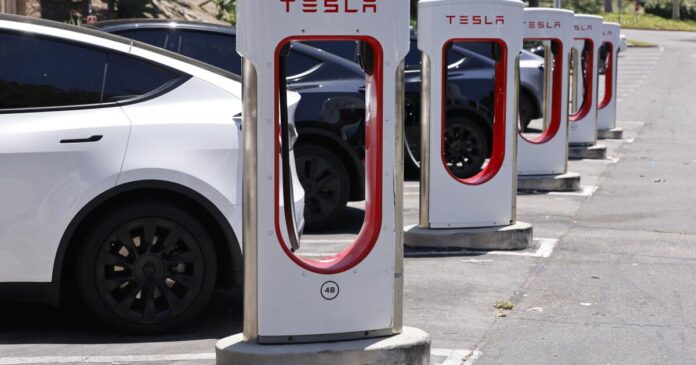"EPA’s Reversal: A Bold Step Backward in Climate Action, Targeting California’s Green Initiatives"
EPA Proposes Repeal of 2009 Endangerment Finding, Signaling Major Shift in U.S. Climate Policy
In a significant policy shift, the U.S. Environmental Protection Agency (EPA) has proposed to repeal its 2009 finding that greenhouse gas emissions pose a danger to public health. This move, which has drawn widespread criticism from environmental advocates, marks a pivotal moment in the nation’s climate strategy, particularly affecting California, a state known for its stringent environmental regulations.
Overview of the Proposal
The EPA’s proposal, announced on Tuesday, aims to rescind the so-called endangerment finding, which has underpinned various regulations aimed at reducing greenhouse gas emissions from vehicles. Supporting documents released alongside the proposal detail the agency’s rationale, asserting that engine and vehicle manufacturers would no longer be required to measure, control, or report greenhouse gas emissions from highway engines and vehicles.
The implications of this proposal are profound. The EPA’s own analysis suggests that without California’s leadership in setting stricter emissions standards, the national adoption of electric vehicles (EVs) could decline. Furthermore, the agency anticipates that gasoline prices may rise due to increased demand for gas-powered vehicles.
California’s Unique Position
California has long held a unique position in U.S. environmental policy, having been granted waivers by the EPA to implement stricter tailpipe emissions standards than those mandated federally. This authority has been crucial in addressing the state’s severe air quality issues, exacerbated by its geography, which traps pollutants in its valleys.
The EPA’s documents reference California 27 times, indicating the state’s central role in the agency’s considerations. California’s ambitious plans include a ban on the sale of new gasoline-powered cars by 2035, a move aimed at accelerating the transition to electric vehicles.
Economic Implications
EPA Administrator Lee Zeldin has argued that repealing the endangerment finding could yield significant economic benefits, claiming it would eliminate over $1 trillion in hidden taxes on American businesses and families. The agency estimates that rescinding greenhouse gas standards could save Americans $54 billion annually.
However, experts like Chris Busch, director of transportation at Energy Innovation Policy & Technology, have expressed skepticism regarding these claims. Busch argues that the analysis fails to account for the potential negative impacts of reduced California regulations, which could lead to fewer EVs on the road and higher gasoline prices.
Environmental Community Response
The announcement has been met with alarm from environmental groups, who view it as a dangerous retreat from the EPA’s mission to safeguard public health and the environment. Critics argue that the agency’s claims about the lack of technology to effectively reduce greenhouse gases are unfounded, especially as major automakers like GM and Ford commit to an electric future.
California’s Energy Commission reported that approximately 22% of new vehicle sales in the state during the second quarter of this year were zero-emission vehicles, underscoring the state’s commitment to clean transportation.
California’s Defense Strategies
In response to the EPA’s proposal, California officials have emphasized their determination to uphold their environmental standards. The California Air Resources Board (CARB) has established several initiatives, including the Clean Truck Partnership, which aims to meet advanced emissions reduction targets in the heavy-duty vehicle sector. Additionally, legislative measures such as Assembly Bill 914 could empower CARB to regulate indirect sources of pollution, further promoting the adoption of electric trucks.
CARB Chair Liane Randolph criticized the EPA’s actions, stating that they reflect a preference for "polluter fantasyland over proven science." She highlighted the ongoing environmental challenges posed by climate change, including heatwaves, floods, and wildfires, and reaffirmed California’s commitment to science-based solutions.
Conclusion
The EPA’s proposal to repeal the 2009 endangerment finding represents a significant departure from established climate policy, with far-reaching implications for both national and state-level environmental efforts. As California continues to push forward with its ambitious clean vehicle goals, the outcome of this proposal could reshape the landscape of U.S. climate action in the years to come. The ongoing legal battles and legislative efforts will likely play a crucial role in determining the future of greenhouse gas regulations in the country.
